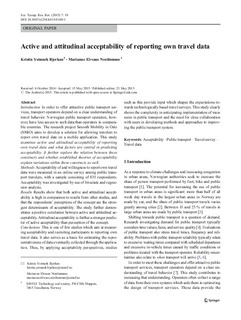| dc.contributor.author | Bjerkan, Kristin Ystmark | |
| dc.contributor.author | Nordtømme, Marianne Elvsaas | |
| dc.date.accessioned | 2019-02-04T11:58:22Z | |
| dc.date.available | 2019-02-04T11:58:22Z | |
| dc.date.created | 2015-05-26T09:04:50Z | |
| dc.date.issued | 2015 | |
| dc.identifier.citation | European Transport Research Review. 2015, 7 (19), . | nb_NO |
| dc.identifier.issn | 1867-0717 | |
| dc.identifier.uri | http://hdl.handle.net/11250/2583727 | |
| dc.description.abstract | Introduction In order to offer attractive public transport services, transport operators depend on a clear understanding of travel behavior. Norwegian public transport operators, however, have less access to such data than operators in comparable countries. The research project Smooth Mobility in Oslo (SMiO) aims to develop a solution for allowing travelers to report own travel date on a mobile application. This study examines active and attitudinal acceptability of reporting own travel data and what factors are central in predicting acceptability. It further explore the relation between these constructs and whether established theories of acceptability explain variations within these constructs as well. Methods Acceptability of and willingness to report own travel data were measured in an online survey among public transport travelers, with a sample consisting of 835 respondents. Acceptability was investigated by use of bivariate and regression analysis. Results Results show that both active and attitudinal acceptability is high in comparison to results from other studies, and that the respondents’ perceptions of the concept are the strongest determinants of acceptability. The study further demonstrates a positive correlation between active and attitudinal acceptability. Attitudinal acceptability is further a stronger predictor of active acceptability than perception of the concept. Conclusions This is one of few studies which aim at measuring acceptability and recruiting participants to reporting own travel data. It also serves as a basis for estimating the representativeness of data eventually collected through the application. Thus, by applying acceptability perspectives, studies such as this provide input which shapes the expectations towards technologically based travel surveys. This study clearly shows the complexity in anticipating implementation of measures in public transport and the need for close collaboration with users in developing methods and approaches to improving the public transport system. | nb_NO |
| dc.description.abstract | Active and attitudinal acceptability of reporting own travel data | nb_NO |
| dc.language.iso | eng | nb_NO |
| dc.publisher | Springer | nb_NO |
| dc.title | Active and attitudinal acceptability of reporting own travel data | nb_NO |
| dc.type | Journal article | nb_NO |
| dc.type | Peer reviewed | nb_NO |
| dc.description.version | publishedVersion | nb_NO |
| dc.rights.holder | © The Author(s) 2015. This article is published with open access at SpringerLink.com | nb_NO |
| dc.source.pagenumber | 12 | nb_NO |
| dc.source.volume | 7 | nb_NO |
| dc.source.journal | European Transport Research Review | nb_NO |
| dc.source.issue | 19 | nb_NO |
| dc.identifier.doi | 10.1007/s12544-015-0169-1 | |
| dc.identifier.cristin | 1244329 | |
| cristin.unitcode | 7401,30,70,0 | |
| cristin.unitname | Mobilitet og samfunnsøkonomi | |
| cristin.ispublished | true | |
| cristin.fulltext | original | |
| cristin.qualitycode | 1 | |
